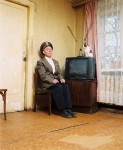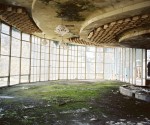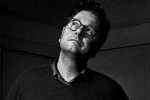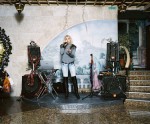Rob Hornstra
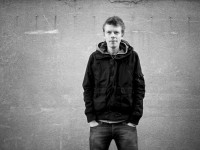
Rob Hornstra (born 14 March 1975, The Netherlands) is a Dutch photographer and self-publisher of documentary work, particularly of areas of the former Soviet Union.
Rob Hornstra studied Social and Legal Services at the Utrecht University of Applied Sciences from 1994 to 1998; for a year from summer 1996 he interned and then worked as a probation officer. From September 1998 he worked for over eight years as a host and bartender at Muziekcentrum Vredenburg (Utrecht). From 1999 to 2004 he studied photographic design at Utrecht School of the Arts.
Since graduation Hornstra has combined editorial work for newspapers and magazines with more personal, longer-term documentary work in the Netherlands, Iceland, and the former Soviet Union. Hornstra considers himself a maker of photographic documentaries rather than a photographer; when not photographing for a particular purpose, he does not carry a camera. Further, he sees books as more important than exhibitions, and regards his own editing, publication and marketing of books of his photography as an important part of his work.
In 2006, together with the art historian Femke Lutgerink, Hornstra started work on Fotodok, an Utrecht-based organization that arranges exhibitions and other events for documentary photography. Itself inspired by Galerie Fotohof inSalzburg, Fotodok hopes eventually to create an exhibition space for documentary photography in Utrecht. Fotodok was launched in 2008; Hornstra stepped down as creative director in September 2009.
Starting with his first collection, Communism and Cowgirls, Hornstra has published his own books. These skip forewords by other writers, biographical notes, ISBNs and the other trappings of conventionally published books; by taking advance orders and selling copies directly and also working through a small number of retailers, Hornstra is able to avoid normal distribution channels.
Together with the writer and filmmaker Arnold van Bruggen, in 2009 Hornstra started the Sochi Project, which over five years would document the area of Sochi (Krasnodar Krai, Russia) and the changes to it during the preparation for the2014 Winter Olympics. Hornstra and Van Bruggen express surprise at the choice of a place so close to politically volatile areas such as Abkhazia and one that by Russian standards has exceptionally mild winters as the site for such a large winter event. Under the slogan slow journalism, the pair request donations from the public for the crowdfunding of a project whose scale is impossible for the mass media.
Hornstra is represented by Flatland Gallery (Utrecht and Paris).

 Deutsch
Deutsch